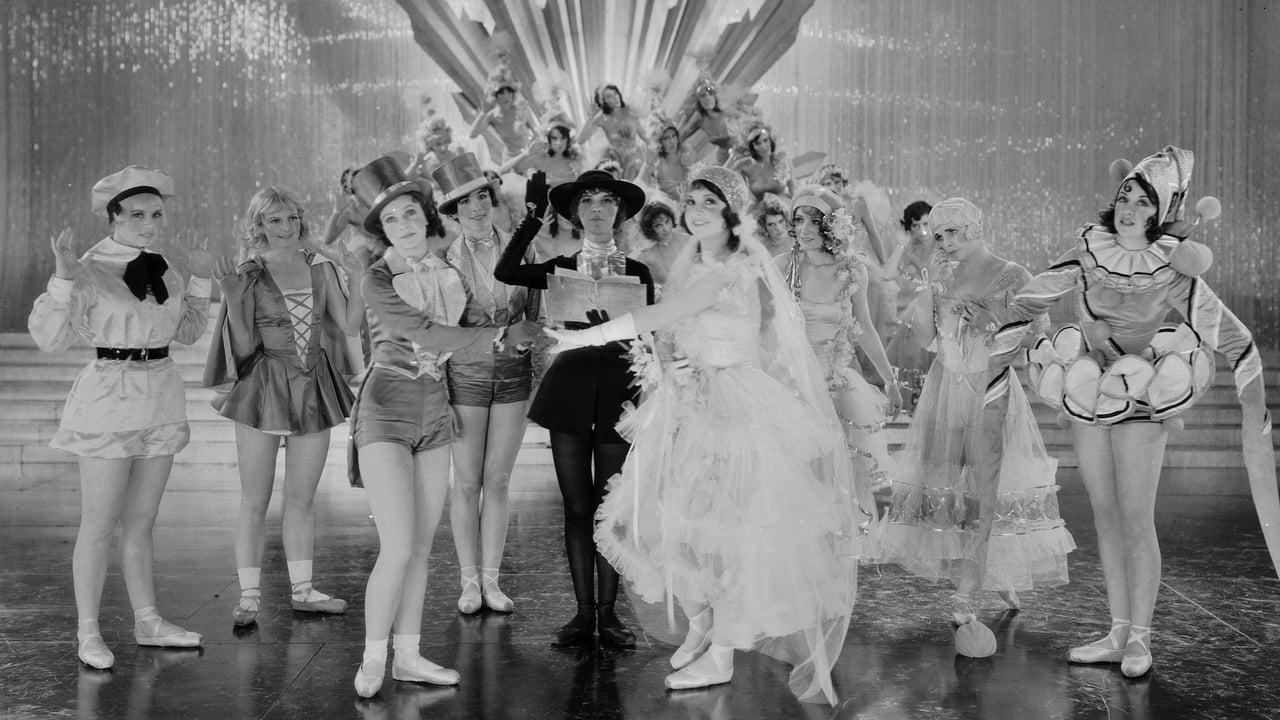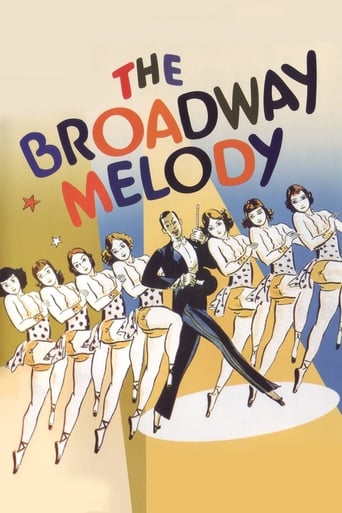TrueJoshNight
Truly Dreadful Film
Roy Hart
If you're interested in the topic at hand, you should just watch it and judge yourself because the reviews have gone very biased by people that didn't even watch it and just hate (or love) the creator. I liked it, it was well written, narrated, and directed and it was about a topic that interests me.
Leoni Haney
Yes, absolutely, there is fun to be had, as well as many, many things to go boom, all amid an atmospheric urban jungle.
Walter Sloane
Mostly, the movie is committed to the value of a good time.
atlasmb
"The Broadway Melody" can be appreciated more for its context than its content. Although it contains some pleasant music, the dialogue is mediocre and the acting is mundane. However, it spans the transition from silent films to talkies--a transition that occurred so quickly that this film, which was MGM's first talkie, still contains remnants of the silent era.Most notable are the title cards which announce the locations though unnecessary. Also, the film companies were scrambling to find talent that could optimize the advent of sound. Charles King plays the male lead, Eddie Kerns, as if he is impersonating Jolson in both song and speech. He is unable to deliver his lackluster lines with conviction, so Eddie comes off as a shallow character. The two sister characters, Queenie (Anita Page) and Hank (Bessie Love), do feel like sisters. Love acquits herself the best, delivering an enthusiastic performance.The film feels like a glimpse behind the scenes of a Broadway revue. And its pre-Code atmosphere helps in that regard. Though some of the action takes place on a stage, there are song performances that advance the plot--a new development--like "You Were Meant For Me". The title song, also by Brown and Freed, is ubiquitous throughout the film, but could have been used to better effect. Here, it's just a throwaway tune that Eddie hopes will be successful.This film was 1929's top grosser and won the Oscar for Best Picture, so they did some things right. But in just a few years, talkies would blossom to fullness, giving viewers musical classics that are still loved today.
JohnHowardReid
NOTES: Re-made (in a considerably cleaned-up version) by MGM in 1940 as "Two Girls On Broadway: with Lana Turner, Joan Blondell and George Murphy.COMMENT: Bessie Love brings Hank to vibrant life. This was her only acting nomination in a screen career that started with a bit part in "The Birth of a Nation" (1915) and continued right through to 1983. It takes talent indeed to so effectively portray a feisty vaudeville artist with such a grossly exaggerated opinion of her own ability. When the Ziegfeld-like character peremptorily decides to cut her number, our sympathies are all with him. He's dead right. Her act might go over okay in Hicksville, but on Broadway it signally lacks class, style and even a touch of elementary pizazz. Yes, Bessie's is a brilliant performance indeed, requiring just the right balance between aspiration and actuality. Although superbly calculated, her go-getting Hank almost always seems too natural and true-to-life. It's only when she breaks down and tearfully erases the make-up that artifice appears to get in the way. Oddly, this was the only scene that NYT critic Mordaunt Hall liked. That's sure a good example not only of the way acting styles change but of the way they impact upon and engage an audience. My daughter won't watch any movies made before 1935. She doesn't like the acting. "People don't talk like that in real life!" she claims. That's very true. But it also happens to be equally true of today's movies and television. The acting styles are totally different, yes. But our friends and neighbors still don't talk that movie way in real life. We just imagine they do!Anita Page, Hollywood's reigning love goddess of 1929 (only Greta Garbo received more fan mail), remains an unqualified delight. She looks the part, she acts the part, and even her scratchy, uncultured voice is just perfect. Like Miss Love, she was unable to capitalize on her role. You can no more make a career portraying beautiful, untalented showgirls than you can feisty, untalented hoofers. Miss Page retired from films in 1936. Sixty years later, however, she made a comeback, appearing in Sunset after Dark (1996), The Crawling Brain (2002), and Bob's Night Out (2004).Oddly, the one genuine vaudeville talent in our star trio, Charles King, (he of the ingratiating voice and charismatic manner), had the shortest Hollywood career of all. He made his debut in this film, then joined Marion Davies in Metro-Goldwyn-Mayer's disastrous "Five O'clock Girl" which executive producer William Randolph Hearst halted and scrapped when he didn't like the rushes. A bad omen. King never repeated his success in Broadway Melody. He played himself in a brief appearance in The Hollywood Revue (1929), then starred in Climbing the Golden Stairs, Chasing Rainbows, Remote Control, Oh Sailor Behave (all 1930) and Ladies Not Allowed (1932). And that was it. Seven films. Count them. He died in 1944. To add insult to injury, King's film credits are often confused with those of that delightfully moronic, stiff-as-a-board, cult western heavy, Charles King, whose legendary incompetence has charmed generations of fans (including me).Director Harry Beaumont, a veteran of the silents, managed the transition to sound with elegance and style whilst most of his contemporaries were floundering. Yet in a few short years, his career was virtually over (though he continued making the odd "B" movie now and then right up to 1947).Studio head Louis B. Mayer was determined not to be outdone or outshone by any other studio. If audiences wanted the novelty of sound, M-G-M was going to sock it to them in truck-loads. And, wow! What a track! Whilst the visuals are not always as innovative, catchy or emotionally rousing as the sound, oddly the only real visual disappointment lies in the Technicolor insert, "The Wedding of the Painted Doll". Miles removed from a Busby Berkeley number, the choreography is too static to garner much audience interest, especially in current prints where the number is disappointingly presented in washed-out black-and-white. DVD available through Warner Home Video. Quality rating: 9 out of ten.
tavm
After several years of only reading about this second Best Picture in Oscar history, I finally got from Netflix this, The original Broadway Melody. It stars Charles King as the leading song-and-dance man who has been going out with one sister Hank (Bessie Love) but eventually falls for the other Queenie (Anita Page), both of whom are trying to make it on the Great White Way. This was the first all-talking musical after Warner Bros.' success with The Jazz Singer which was mostly silent except for Al Jolson's songs and his occasional talks in between them. The story is the kind the studios would do over again and again, with some variations, throughout the subsequent 30s and the acting is mostly of the take-it-or-leave-it kind considering how the way things are paced for such an early talkie seemed lumbering despite the short, for a feature, running time. The songs, by Nacio Herb Brown and Arthur Freed who'd eventually be M-G-M's premiere producer when making great musicals, are enjoyable enough though the numbers made of them probably could have been a little more elaborate camera-angle-wise though it's amazing they even got them filmed at all what with all the transitions from silent-to-sound all the studios were experiencing. Overall, The Broadway Melody is not a great picture but for historical purposes, it is a fascinating document of the kind of backstage programmer that would permeate during the following decade...
Lechuguilla
Historically significant, among other things, as the first all-talking musical feature film, how could anyone not appreciate this great old movie. The story isn't much. A sister act, the Mahoney Sisters (Queenie and Hank), tries to make it big on The Great White Way. Romantic complications keep the plot moving. As a "talkie", the script is exactly that ... talky. The dialogue is clunky and the conflict a bit contrived. But who cares? The performers seem to enjoy what they are doing. And the two female leads (Anita Page and Bessie Love) are marvelous.This film really gives the viewer a good feel for 1920s style. Production design is plain and drab. I would describe the costumes as "interesting", with those flappers' unique hairdos and hats. And I'm constantly amazed at 1920s interiors with their high ceilings. Every room seems to lord over its human occupants, especially the theater proscenium where the title song is performed.The B&W cinematography isn't bad. I did notice the film's second half had visuals pleasantly high in contrast, compared to the first half. The second half, especially toward the end, looks pretty good. A few scenes appear a bit blurry or maybe out of focus. But film editors really had a lot to learn in those days, like the need to cut useless seconds when actors don't act, but just stare. The film's sound quality varies. Some scenes contain a bit of background static; in other scenes it's largely absent.Musical numbers are primitive but nonetheless enjoyable. I like that title song. It's played often throughout the film. And they were really big on tap dancing back in the twenties.If the viewer gives the film some slack, "The Broadway Melody" can be an enjoyable cinematic trip back to a fun era. It was a time when filmmakers were still learning their crafts; when viewers were satisfied with simpler, more basic, entertainment; when moralistic censors had yet to intrude; and especially when the world, unknowingly, was at the brink of economic collapse.

